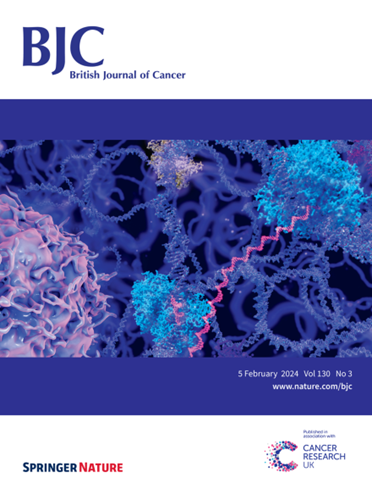IL-10RA governor the expression of IDO in the instruction of lymphocyte immunity
IF 6.4
1区 医学
Q1 ONCOLOGY
引用次数: 0
Abstract
Indoleamine 2,3-dioxygenase (IDO) impairs anti-pathogen and anti-tumour immunity. Mesenchymal stem cells (MSCs) modulate immunity via IDO but also suppress IFN-γ. While MSC IDO induction by IFN-γ is established, other drivers in this immunosuppressive setting remain unknown. Human bone marrow mesenchymal stem cells (MSCs) with IDO or IL-10RA knockdown were co-cultured with healthy donor T cells to assess immunosuppression. PDAC organoid anticancer activity was also tested in these co-cultures. Co-culturing MSCs with T cells in an IL-10RA-enriched environment enhances IDO expression, resulting in T cell suppression. Moreover, IL-10RA-positive MSCs collected from co-cultures with IL-10 supplementation show increased IDO expression. Conversely, MSCs with IL-10RA knockdown exhibit a significant reduction in IDO RNA and protein expression, as well as STAT3 phosphorylation status, which is a known upstream signalling pathway in IDO gene regulation, in T cell co-cultures. Down-regulation of IL-10RA also inhibits IDO activity in MSCs, resulting in reduced T cell suppression, and enabling the co-cultured T cells to kill PDAC organoids. Our research reveals IL-10RA as a pharmacological target in stromal cells for enhancing T cell-mediated PDAC eradication by downregulating IDO via blocked IL-10/IL-10RA signalling in MSCs. This advances IL-10RA interference in the tumour microenvironment (TME) to restore T cell cytotoxicity against cancers.

IL-10RA 在指导淋巴细胞免疫中调节 IDO 的表达。
背景:吲哚胺-2,3-二氧化酶(IDO)会损害抗病原体和抗肿瘤免疫。间充质干细胞(MSCs)通过 IDO 调节免疫,但也抑制 IFN-γ。方法:将敲除IDO或IL-10RA的人骨髓间充质干细胞与健康供体T细胞共培养,以评估免疫抑制。在这些共培养物中还测试了PDAC类器官的抗癌活性:结果:在富含IL-10RA的环境中将间充质干细胞与T细胞共培养会增强IDO的表达,从而导致T细胞抑制。此外,从补充了IL-10的共培养物中收集的IL-10RA阳性间充质干细胞显示出IDO表达增加。相反,在T细胞共培养中,IL-10RA基因敲除的间充质干细胞的IDO RNA和蛋白表达以及STAT3磷酸化状态均显著降低,而STAT3是IDO基因调控的已知上游信号通路。IL-10RA的下调也抑制了间充质干细胞中IDO的活性,导致T细胞抑制作用减弱,并使共培养的T细胞能够杀死PDAC器官组织:我们的研究揭示了IL-10RA是基质细胞中的一个药理学靶点,可通过阻断间充质干细胞中的IL-10/IL-10RA信号来下调IDO,从而增强T细胞介导的PDAC根除作用。这推动了IL-10RA对肿瘤微环境(TME)的干预,以恢复T细胞对癌症的细胞毒性。
本文章由计算机程序翻译,如有差异,请以英文原文为准。
求助全文
约1分钟内获得全文
求助全文
来源期刊

British Journal of Cancer
医学-肿瘤学
CiteScore
15.10
自引率
1.10%
发文量
383
审稿时长
6 months
期刊介绍:
The British Journal of Cancer is one of the most-cited general cancer journals, publishing significant advances in translational and clinical cancer research.It also publishes high-quality reviews and thought-provoking comment on all aspects of cancer prevention,diagnosis and treatment.
 求助内容:
求助内容: 应助结果提醒方式:
应助结果提醒方式:


